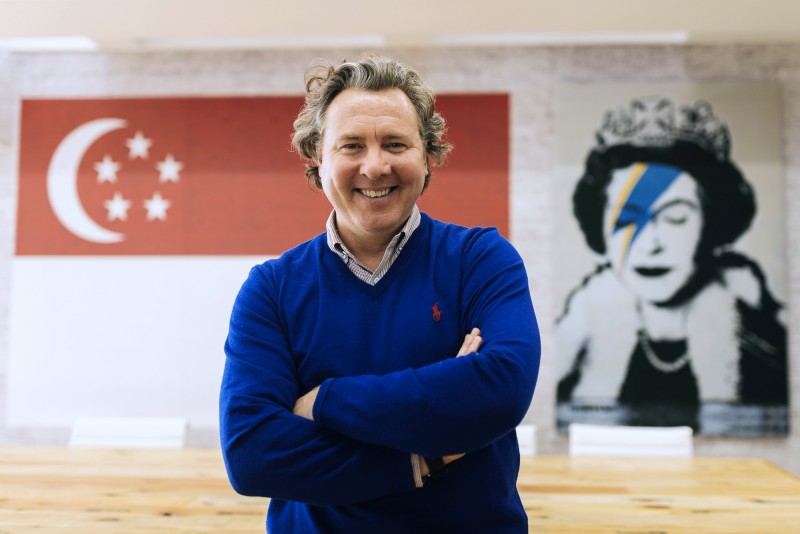If you make a clearing in the middle of a forest, you have Zen and peace, says David Spencer-Percival. “So I bought a forest and after that, I thought: why have I got a forest?” he asks half-rhetorically, the other half, probably in amazement of himself. The eccentricities are obvious, but the showmanship belies an astute brilliance.
“After I sold the forest, it went up 5 times in value the year after!” he bellows. He’d bought it because he thought environmentalism would come to fore, making them valuable assets. The classic cars he owned soared in value too, after selling them. “It pains me to talk about them,” he winces. But Spencer Ogden was the more pressing objective. “I had to get back into the right mindset. If you can afford to fail, you probably will fail,” he tells me. “You need pure focus and determination. There are no shortcuts.”
He will probably get rid of anything that distracts him, including children. “I don’t particularly like children,” he proclaims, very candidly. “I’d probably send them off to boarding school until they’re interesting.” DSP, as his staff calls him, is a man of extremes. He speaks his mind, but not in a bad way. These days, frank people are rare to come by in a world plagued with so much obfuscation and facades. He has a way with it, tapering often offshoot remarks with booming laughter, which reminds me how Jeff Bezos does it.
He’d flown into Singapore to visit the new local office, which had already set off a buzz for its Google-like-ness: Ping Pong table, mini golf, Astroturf, and baseball bats – probably not the best idea in a high-stress environment on a 34th floor office with full-on glass windows. The meeting rooms are decorated with ornate oriental furniture. An antique opium bed takes up almost half of one of the other rooms. It’s just missing a bong, and the opium.
“I’m quite the addict,” he says – not of opium, but of the success of Spencer Ogden, which is only 5 years old, and already expecting S$200 million in revenue this year. “If I weren’t doing this, I’d be quite bored.” He reminds me of a sort of uber-capitalist version of Russell Brand. They both speak their minds, are British, wealthy, but the similarities stop there. “I really object to people who are socialists, especially academic socialists,” he expounds. “They’re not from the working class, so I have no respect for them.”
The recruiters can be seen pacing around the office on headsets, finding a quiet corner to close a deal. We are interrupted by a sudden burst of celebration outside. I learn there is a ritual every time a deal is closed: a song of sorts and the hitting of a Chinese gong. There are even screens that track how many deals each recruiter has closed for the month. “We wanted to do what some of the tech companies are doing,” he says. “I’d worked in some crappy offices before, and I can tell you young people don’t want to work in those.” As the photographer shoots him, he discloses as a matter-of-factly, “You’re shooting my fake watch.”
Conversations with David Spencer-Percival
YONG HUI YOW: Really.
DAVID SPENCER-PERCIVAL: You’ve been to Hong Kong, haven’t you?
YONG HUI: How different was starting Spencer Ogden and Huntress?
DAVID: The main difference is I’m in charge now, and own a sizeable part of the company. Spencer Ogden is also in a different sector, and grew twice as quickly.
YONG HUI: How did you do that?
DAVID: We had a good business model, and I knew how to build the company quickly. We also had the funding. My business partner, Sir Peter Ogden, is a very wealthy man. He was prepared to grow the business quickly at the expense of more financing. The timing was also right. We set up in a recession. In London, there were 100,000 graduates looking for a job.
YONG HUI: What motivated you to sell your possessions?
DAVID: I needed to be in the right state of mind, and I needed capital. When you have a lot of things, they cost a lot to look after: Houses, cars… but I didn’t need all of that stuff. They’re distractions. I have no children so I have no responsibilities; I still don’t, so it’s great.
YONG HUI: Do you plan to have kids?
DAVID: No. It’s a conscious decision. I don’t particularly like kids. I think they are fantastic after eighteen, when they bring you champagne and stuff. I’d send them off to boarding school until they’re interesting.
YONG HUI: What about adopting?
DAVID: Somebody asked me that the other day. Yeah, I could adopt.
YONG HUI: As long as they’re older than eighteen.
DAVID: Yeah, but to be honest with you, I don’t have time. If I suddenly stopped doing this [Spencer Ogden], I’d get quite bored. Then I could be like Brad and Angelina, and have my set of children, all from different places. But I’m too selfish with my time. Time is very precious.
YONG HUI: Don’t you want to have a legacy you leave behind?
DAVID: No, I don’t care about that stuff. I know a lot of people get very hung up over that. Family people – they want to build a significant amount of wealth, and pass it on to future generations. Some people do it because they want to be looked after in their old age, but I have a team of nurses. [laughs] You have one life and it’s a very short life. I’d rather give my money to charity.
YONG HUI: Are there specific causes you’re interested in?
DAVID: I’m passionate about non-humanities things. I’d give my money to more scientific, natural histories stuff. I believe they create longer legacies.
YONG HUI: You spoke about the right mindset, what is the right mindset?
DAVID: The right mindset is pure focus and determination. There are no shortcuts. If you concentrate on one thing, and you put all your efforts into it, and you, really, really focus, you should succeed, unless you get a lot of bad luck. You have to take risks: high risks, high reward. Sure, you can make mistakes, but you have to bounce back. I’ve made a lot of mistakes.
YONG HUI: What are distractions for you?
DAVID: I sold a company [Huntress] before for 7-figures, and I found it very distracting, because you have to work out what to do with it. I quite like not having any money. I find it a very pure and cleansing thing. My business partner, Peter sold a company a month ago. He bagged US$200 million in cash, and he wasn’t very happy. Now, it’s hugely distracting for him.
YONG HUI: What are distractions for entrepreneurs?
DAVID: Getting involved in too many things. Many entrepreneurs fail because they diversify too quickly. If you stick to doing one thing really well, you’ll probably be more successful. Your focus cannot be diluted to succeed.
YONG HUI: What did your wife say when you sold your possessions?
DAVID: Well, I’m still married. [laughs] She was surprised, but a 100 per cent behind what I had decided to do. That’s the kind of reaction you want. If your wife turns around and says, “Oh my god, does that mean the Bentley goes? Then you got a problem! Without a supportive partner, you wouldn’t be able to do it.
YONG HUI: She believed in you.
DAVID: She did believe in me, yeah.
YONG HUI: After you sold your cars, what did you drive?
DAVID: It pains me to talk about it. I sold my cars at exactly the wrong point in classic car history over the last 13 years. They’re now worth millions of pounds. I sold a classic Ferrari, two Aston Martins, a Bentley, and a classic Mercedes Benz. I loved them, but they had to go.
YONG HUI: Did you buy a cheaper car?
DAVID: I bought a bicycle, and cycled to work for the first year. I also bought a train card, because I had not been on the underground for 10 years.
YONG HUI: Have you bought back the classic cars now?
DAVID: I cannot afford them now! They’re worth millions of pounds. Also, they need a lot of looking after. It’s like having children. I had a great time, enjoyed it, loved it, but I won’t do it again.
YONG HUI: Anything that’s a drain on your time is removed.
DAVID: I think so. I’ve simplified my life because it gets very complicated. I do one thing and I do it very well. I don’t want to be distracted by lots of complicated financial instruments, or possessions, and stuff like that.
YONG HUI: When you got your first big pile of money, how did it change you?
DAVID: I became a little aggravated, as people do when they get money. The first thing is you realise who your friends are. People can become very jealous when you have money. I also became a bit political. See, it’s easy to drift into this sort of rarefied atmosphere, where you turn your nose up on a lot of things, because you can afford to. You go to a restaurant, or hotel, it’s not good enough, you want a better room, a better restaurant, better this and better that. Problem is: it never stops, so you have to stop yourself, and have some realism in your life.
YONG HUI: Do you plan to go into politics?
DAVID: God, no. Do you know how frustrated I’d be in politics? You’d never get anything done. Spencer Ogden works because I have a very strong vision, and you have to keep that vision in line. With any kind of politics, you end up saying what you think people want to hear. I’d last 5 minutes in politics. I’m too wise to be a politician.
YONG HUI: Who is your favourite British politician?
DAVID: I like Boris Johnson. He is sort of seen as a bit of an idiot, but an awfully bright idiot. I think he could be the next Prime Minister. He’s the only politician who talks straight. I don’t mind Cameron, but the problem with him is he’s trying to please everybody instead of being a true Tory. Boris just tells it like it is. Obviously, I love Margaret Thatcher, who is my hero. I’m one of Thatcher’s children – born in the 70s, grew up in the 80s. I really object to people who are socialists, especially academic socialists. They’re not from the working class, so I have no respect for them.
YONG HUI: How about your favourite business people?
DAVID: I’m in awe of my business partner. He’s incredibly down to earth. He is aggravatingly cool. I have respect for some of the tech guys. I think they’ve done incredibly well with some ideas… Zuckerberg gets a lot of criticism, but let me tell you: companies like that [Facebook] don’t get that big only because of successful software. It takes a lot more to build that company. The Google guys – incredible stuff. I respect people generally, who take a risk. I think that’s admirable in business – risk takers.
YONG HUI: What do you think is wrong with the British system?
DAVID: I love the UK. I couldn’t be anywhere else. But I don’t agree with businesses not paying taxes. I think it is unacceptable that large corporations avoid taxes, when their employees have National Health Service (NHS), paid for by the taxpayer. The country is defended by the armed forces, paid for by the taxpayer. It is unacceptable for people to do business in the UK and not pay taxes. Other than that, I don’t think I would change anything much – tweaks, perhaps.
YONG HUI: Oil prices have taken a hit. How do you see it playing out this year?
DAVID: I’m quite philosophical about the fall in oil prices. First of all, it is a good thing for us as our competition will become weaker as we become stronger. The great thing about having a very wealthy backer is that he’s not a short-term player. We don’t really care what the price of oil is now. We care what it’s like in 3 to 5 years’ time. We’ve pinned down oil and gas for 5 years, because it was the low hanging fruit. Now, we can finally invest in the other sectors.
YONG HUI: How badly affected is the shale oil industry in the US?
DAVID: It’s difficult to tell at the moment. The Americans can afford oil at US$60, US$70 a barrel. US$40, US$50 a barrel is quite painful. They have a choice: they can sweat it out and see what happens, or they cut their costs. Highly-leveraged companies will cut their costs. Those with good balance sheets will carry on. It’ll become quite Darwinian. Those that do survive will come through very well, because their competition will be eliminated. Asia will be relatively unaffected because most of the oil companies are state-owned. Middle East, little affected. But America, because it has lots of service companies and privately-owned, highly-leveraged companies – they all suffer.
YONG HUI: Why are the Saudis doing this?
DAVID: I think they’re very clever, to push out the producers in shale, to reduce the capacity in shale. America has a big conundrum because they can either support its local economy, if it wanted to not rely on the Middle East. At the same time, the fall in oil prices is killing Russia. What do you do?
YONG HUI: Do you think the Saudis are bluffing?
DAVID: No, I don’t. I think they have a long-term play. It’s a good old-fashioned price war.
YONG HUI: Someone said that oil prices will never go above 100 dollars a barrels again. What do you think?
DAVID: Goldman Sachs, a month before oil collapsed, said it would be US$200 a barrel. If they can’t get it right, I sure can’t, and they have about 500 analysts. Do I think it’s going to go back up again? Yes. The problem with oil is that it is a commodity.
YONG HUI: Renewables. What do you think?
DAVID: I love renewables. When we started the company, it was going to be a 100 per cent renewables. Unfortunately, it’s not a big enough market for us to grow this big. The halfway house between conventional and renewable is gas, because it is cleaner than oil and coal, but not as clean as renewables. What you’ll see is a transition to gas-fired power stations and gas cars. After that, you’ll see renewables take over. But it will take maybe two decades at least. You can build clear solar panels now, so you can encase this entire building with solar panels, which will heat and light the building. The technology in renewables is immense.
YONG HUI: What do you think of Tesla?
DAVID: The original Tesla was a genius.
YONG HUI: What about the new Tesla?
DAVID: It’s a great car: most electricity, so basically, it’s a coal-fired car. It’s not renewable; it’s electric. Electricity comes from coal-fired power stations, predominantly. Once you create energy from water, then you got a real renewable car.
YONG HUI: What is the misconception about renewables?
DAVID: When you see a wind turbine flying around, everyone says, “This is fantastic! Look, it’s renewable energy!” Someone has had to dig a dirty big hole to get rare earth materials out, to build the magnet that makes the blade go around.
YONG HUI: So it’s marketing.
DAVID: Some of it. The purest form of renewable energy is solar or tidal. Wave tidal is fantastic. The moon has been pulling the waves for billions of years. Unfortunately, it’s the least invested in, which is unbelievable.
YONG HUI: Any plans to go public?
DAVID: As long as I’m CEO, we’re not going public. I think we’ll do private equity. I like the discipline of it. The problem with going public — is you have one bad quarter, and you destroy your share price for a year. And you have some 28 year old analyst saying your value is this and that. I don’t think we are big enough; you need to be at least US$20 million EBITA to go public. Otherwise, you’re sat on small markets, there’s no liquidity, and the share price gets marked down. In the future, when Spencer Ogden gets big enough – a billion dollar company, it could go public. But I won’t be running it.
YONG HUI: Why not?
DAVID: I’m getting old! [laughs] I’ve been doing this for 20 years. There are much younger, brighter, and more energetic than me out there [in the office]. There are 3 people already that can do a better job than me.
YONG HUI: When you started the company, what culture did you want?
DAVID: I thought we could do something a lot of the tech companies are doing. I wanted to be a disruptor. I wanted to create an entire business with the youngest, brightest people I can find. The average age is 23, 24. I wanted people to have fun, but work very hard.
YONG HUI: This looks like Google’s office.
DAVID: Google? What’s that, never heard of it. [laughs] My wife designs the offices, and we have a lot of fun doing it. I worked in crappy offices for years – the blue carpets, suspended ceilings, gray desks and cubicles. That era is gone. The people we employ; they want to work in offices like this. Their parents want them to work in cubicles, but they want to play table tennis.
YONG HUI: How do you motivate them?
DAVID: Financially, predominantly. We’re built on sales success.
YONG HUI: How much will your revenues be this year?
DAVID: About S$200 million.
YONG HUI: What is your relationship like with Sir Peter?
DAVID: It’s great! We joke. We’re 50-50. That means I work 50 weeks a year, he works 50 minutes a year! [laughs] He writes some very big cheques. I see him, if I’m lucky, 3 times a year. He’s the best investor anyone can wish for. I like him; he is a good guy.
YONG HUI: How should one choose business partners?
DAVID: Very carefully. It’s the most important decision you can make, because if you fall out with your business partner, the business is finished. Do not go into business with anyone just because they have money. It’s the worst thing.
YONG HUI: What kinds of investors should one never take money from?
DAVID: Ones that have a different long-term objective from you. There is no point setting out on a 10-year journey with somebody who wants a 2-year journey. You have to be aligned with your partner. You have to be very careful about being fair and equal, otherwise, you get resentment, and no one wants to resent their business partners. It will cause problems.
YONG HUI: Did you feel you were different growing up?
DAVID: I’m very focused, but I don’t know where ambition comes from. For a lot of people, I assume they have the ambition as me, but they don’t. I don’t know if it’s taught or genetics – I’ve no idea. Focus is the only difference between people who become successful and those who don’t. You have to be really, really focused. Not just say it, do it – that’s the difference.
YONG HUI: Was it primarily driven by money?
DAVID: It was in the beginning, then it became about success, then it became a bit of a game. But first, you need the drive and ambition.
YONG HUI: What is your management style?
DAVID: Dictatorial. [laughs] My management style is: I lead, you follow. I’m normally right. My wife will back me up on this. I’m aggravatingly right in one small field. I know recruitment more than anybody else.
YONG HUI: How is the recruitment industry changing in the future?
DAVID: It’s changed a lot since I’ve been in it, predominantly, through things like Linkedin. A lot of firms also use their own internal recruiter. It’s become commoditised at the lower levels, so you have to differentiate in the higher services and skilled sectors. Will technology eradicate agents? Possibly. Technology can be a very, very powerful thing. I’m an old-fashioned recruiter. I like to communicate via telephone, but that’s a dying art.
YONG HUI: Why did you buy a forest?
DAVID: I thought forests were cheap. When I bought it, it was 1500 pounds an acre, and I was convinced forestry was going to be worth a lot because of environmentalism. I also wanted peace and tranquillity, and you only get that in your own forest. You make a clearing in the middle of it and you have zen and peace. There’s no capital gains tax on wood, and they just keep growing!
YONG HUI: What about the animals on the land?
DAVID: Yeah, I got deer, pheasants, and rabbits… beautiful wildlife… forests are beautiful things. They should be protected… from people like me [laughs]. But seriously, I was a patron of the Natural History Museum for many years.
YONG HUI: Do you have a favourite scientist?
DAVID: Darwin is about as good as it gets. He was just extraordinary. You cannot underestimate the period of time that he lived in, to come out and say that evolution was not God. It was absolutely outrageous at the time. The Origin of Species was one of the bravest things to do because his entire career was in jeopardy, but he was right! Even now, people in America will not accept Darwin.
YONG HUI: Is that how you run your company?
DAVID: Yes. All nature is Darwinism. It’s like that in business. Business is brutal.
YONG HUI: Do you have any regrets?
DAVID: I didn’t marry Rosie Huntington. [laughs] I didn’t invent the algorithm for Google. I sold my Aston Martin too early. But no seriously, I don’t think you can have regrets. You can’t do anything about it for a start.
YONG HUI: Have you invested in any tech companies?
DAVID: I wish I’d invested in Apple. When that iPod came out, a friend of mine said, “Look at this, it’s amazing, it has no moving parts, and it plays music.” I should have invested in what I thought was cool and I liked, rather than some broker telling me to invest in this or that. Let me tell you: they know nothing. I promise you. There was this experiment, and they threw darts at newspapers with stock listings at them. Guess what? The darts had a better return.
YONG HUI: Are you agnostic or atheist?
DAVID: Agnostic I would say. Funnily enough, I’ve grown to think there is a something about intelligent design, but I don’t believe there is a god with a great big beard sitting on a throne somewhere. However, the deeper you delve into mathematics, and the more you look at nature, it’s fiendishly clever, and you do wonder if there is some kind of intelligent design. There are too many things in mathematics and nature that follow a pattern that don’t seem random. So, maybe, but not a big fan of religion I have to tell you. As they say, never talk about religion and politics. I seem to be getting drawn into both now!
YONG HUI: What is it about religion that you don’t like?
DAVID: I don’t believe in indoctrinating people. My father was very clear when I was younger that I wouldn’t be baptised. My father said to me, “You make your own mind when you’re ready to.” Such great advice! I just think it’s unfair to put it on people on such a young age. Fundamentally, most religions are broadly the same; they’ve just been twisted and turned throughout the centuries. I think pure religion is a good thing. But I think it’s gone down some very strange paths.
YONG HUI: How do you want people to remember you?
DAVID: I don’t care; I’d be dead, I think the whole thing is just an ego trip. It’s one life. There’s no life after death – this is it.







